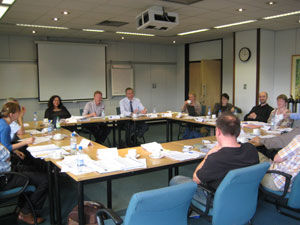University News Last updated 29 July 2010

A leading Birmingham academic has secured a highly prestigious grant under the UK Research Councils’ Rural Economy and Land Use Programme (Relu) as part of the environmental change agenda addressing the need for improved management of the rural-urban fringe.
Dr Alister Scott, a Reader in Spatial Planning at Birmingham City University, has been awarded £145K to lead interdisciplinary research to inform future policy and practice within the rural-urban fringe. He explains: “The Rural Urban Fringe is that fuzzy area where countryside meets town, with a whole variety of different uses in evidence; conservation, recreation agriculture, forestry and development. Yet, amazingly, its overall management has been haphazard and reactive reflecting problems of overall understanding with no co-ordinated vision.
“In this research we are seeking to answer pretty fundamental questions: What is this rural-urban fringe? How is it changing? And how can we manage change to best advantage to address the big environmental challenges proactively? Our response is to use and adapt existing theories, tools and approaches by combining the expertise of academics and practitioners within one interdisciplinary team.”
The Relu grant is located within the Centre for Environment and Society Research and runs for 18 months (from July 1st 2010). It is an exciting partnership project involving Birmingham Environment Partnership, the University of Aberdeen, David Jarvis Associates, Forest Enterprise, Green Economics Institute, Localise West Midlands, National Farmers Union, Natural England, West Midlands Rural Affairs Forum and Worcestershire County Council.
Dr Scott added: “We have secured a highly talented and experienced team of academics, practitioners and professionals committed to sustainable management and planning outcomes but working across traditional urban and rural, and social and natural science boundaries. Our team will harness their collective experience and knowledge to create an improved framework within which strategic planning for the rural-urban fringe might flourish. At a time when the strategic planning layer has been removed in England, such new intelligence will help put the rural-urban fringe back firmly on to the policy and research agendas and provide a important lessons for the generation and dissemination of knowledge.”
Professor David Maguire, Pro Vice Chancellor for Research at Birmingham City University, sees this project as further evidence of growing research excellence at the University. He commented: “This prestigious award reflects significant investment in research made by the University and demonstrates our growing research capacity and capability across key areas of policy. Of particular note for Birmingham City University is the growing importance of environmental change research transcending natural and social sciences.”
Professor Mel Lees, Head of the Faculty of Technology, Engineering and the Environment (TEE) at Birmingham City University, endorses this research as building on our already excellent links with industry. He said: “The University is proud to work in partnership with a wide range of interests and industry. We sometimes forget there is a rural industry out there with its own needs. As city and countryside increasingly converge in both time and space there is a need to go beyond simple stereotypes and explore synergies. This research on the rural-urban fringe is timely and important. Birmingham City University is extremely excited to plough a new furrow in our institution’s research focus”
Relu Director Philip Lowe welcomes this project. He added: "The Rural Economy and Land Use Programme was designed to bring a range of disciplines together in interdisciplinary teams to address challenges facing rural areas and it is timely that in this stage of the research we are looking at the urban/rural connection. Increasingly, our strategy must include adaptation as well as mitigation if we are to cope effectively with changes to our climate and our environment and this focuses particular attention on the future of the rural-urban fringe. I therefore welcome this new project."